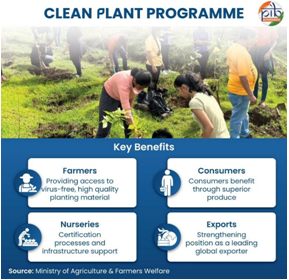

23th September 2025 (13 Topics)
Context:
The Union Cabinet approved the Clean Plant Programme (CPP) to provide Indian farmers with virus-free, high-quality planting material, aiming to enhance horticulture productivity and global competitiveness.
Ensuring Disease-Free Horticulture
Challenges in Plant Health
- Climate and Biotic Threats:
- Climate change, pests, and systemic pathogens like viruses pose major risks to crop productivity and quality.
- By the time symptoms appear in the field, yield losses are often irreversible.
- Significance of Preventive Measures:
- Use of high-quality seeds and disease-free planting material is recognized as the most effective strategy.
- Preventive measures have no adverse side effects compared to chemical interventions.
Overview of Clean Plant Programme (CPP)
- Launch and Implementation:
- Approved by Union Cabinet in August 2024, under the Ministry of Agriculture and Farmers Welfare.
- Implemented by the National Horticulture Board (NHB) with technical guidance from ICAR.
- Investment: ?1,765.67 crore, including $98 million ADB loan.
- Objectives:
- Provide virus-free planting material of key horticultural crops.
- Enhance farmer income, productivity, and global competitiveness.
- Promote equity, inclusivity, and climate-resilient practices.
- International Collaboration:
- Partnerships with Israel and the Netherlands for best practices and technology transfer.
Key Infrastructure and On-Ground Actions
- Clean Plant Centres:
- Nine centres to be established across India; three in Maharashtra for grapes, oranges, and pomegranates (?300 crore).
- National-level laboratory in Pune for original plant species research.
- Nursery Development:
- Large nurseries supported with ?3 crore; medium nurseries ?1.5 crore.
- Annual distribution: 8 crore disease-free seedlings.
- Hazard Analysis and Laboratory Assessments:
- Profiling viruses to ensure certification.
- Crop-specific surveys: Grapevine (578 samples), Apple (535 samples), Citrus in preparation.
- Bioinformatics pipeline for HTS data developed for faster virus detection.
- Source to Soil Protocol:
- Pathogen-free material undergoes re-testing, propagation, and distribution via accredited nurseries.
- Positive material undergoes virus elimination through tissue culture, heat, or cryo-therapy.
Benefits and Broader Impact

- Farmers:Higher yields, improved quality, and increased income.
- Nurseries:Streamlined certification, infrastructure support, and growth opportunities.
- Consumers:Virus-free, nutritious, and better-quality fruits.
- Exports:Strengthens India’s global horticultural competitiveness.
- Equity and Inclusivity:Affordable access for all farmers; active participation of women; region-specific clean plant varieties.
- Alignment with National Initiatives:
- Mission LiFE: Promotes sustainable and eco-friendly horticultural practices.
- National One Health Mission: Integrates human, animal, and environmental health to address plant-livestock-human interactions.
- MIDH: CPP complements Mission for Integrated Development of Horticulture, enhancing productivity from 12.10 MT/ha (2019–20) to 12.56 MT/ha (2024–25).
Comprehensive Analysis
- Strategic Importance: CPP addresses systemic pathogen threats, ensuring sustainable horticulture growth.
- Economic Impact: Boosts farmer income, rural employment, and export potential while reducing crop losses.
- Technological Integration: Hazard analysis, bioinformatics, and tissue culture enhance disease detection and prevention.
- Policy Synergy: Alignment with MIDH, Mission LiFE, and One Health ensures holistic development and sustainability.
More Articles


